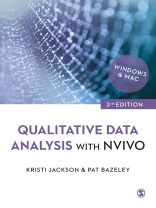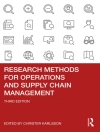Engaging and accessible, this book offers students a complete guide to using NVivo for qualitative data analysis. Drawing on their wealth of expertise, the authors offer detailed, practical advice that relates to students’ own experience and research projects.
Packed with real-world examples and case studies, the book supports students through every stage of qualitative data analysis.
The Third Edition:
- Contains fully integrated instructions for using NVivo on both Mac and PC, with screenshots and click-by-click guidance.
- Seamlessly interweaves theory and practice in easy-to-follow steps.
- Empowers students to develop their critical thinking.
Accompanied by video tutorials for both Mac and PC, web links and a host of other helpful online resources, this step-by-step book removes students′ anxiety about tackling data analysis. Whether for advanced researchers or those approaching the task for the first time, this clear, yet comprehensive guide is the perfect companion for anyone doing qualitative data analysis with NVivo.
Cuprins
Chapter 1: Where to begin?
Chapter 2: Designing an NVivo project
Chapter 3: Coding foundations
Chapter 4: Advanced coding
Chapter 5: Cases, classifications and comparisons
Chapter 6: Surveys and mixed methods
Chapter 7: Querying data
Chapter 8: Literature reviews and PDF files
Chapter 9: Working with multimedia files
Chapter 10: Twitter, Facebook, You Tube and web pages
Chapter 11: Teamwork
Chapter 12: Moving on – further resources
Despre autor
Pat Bazeley is Director of Research Support P/L and Adjunct Professor in the Translational Research and Social Innovation Centre at Western Sydney University. Since graduating in psychology, she has worked in community development, as an evaluation researcher, and in academic research development. For almost 30 years Pat has been providing research training and project consulting to academics, graduate students and practitioners representing a wide range of disciplines across Australia and internationally. Her particular expertise is in helping researchers to make sense of qualitative, survey, and mixed methods data, and to use computer programs for management and analysis of data. Pat’s research has focused on qualitative and mixed methods data analysis, the development and performance of researchers, and the wellbeing of older women. She has published books, chapters, and articles on mixed methods and qualitative data analysis. She serves on the Editorial Board of the Journal of Mixed Methods Research and was 2015–2016 President of the Mixed Methods International Research Association.












